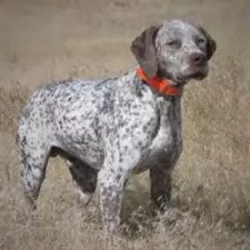 MyDogBreeds
MyDogBreeds Lurcher is originated from United Kingdom but Braque du Bourbonnais is originated from France. Lurcher may grow 18 cm / 8 inches higher than Braque du Bourbonnais. Lurcher may weigh 7 kg / 16 pounds more than Braque du Bourbonnais. Lurcher may live 3 years more than Braque du Bourbonnais. Both Lurcher and Braque du Bourbonnais has almost same litter size. Both Lurcher and Braque du Bourbonnais requires Low maintenance.
Lurcher is originated from United Kingdom but Braque du Bourbonnais is originated from France. Lurcher may grow 18 cm / 8 inches higher than Braque du Bourbonnais. Lurcher may weigh 7 kg / 16 pounds more than Braque du Bourbonnais. Lurcher may live 3 years more than Braque du Bourbonnais. Both Lurcher and Braque du Bourbonnais has almost same litter size. Both Lurcher and Braque du Bourbonnais requires Low maintenance.
 The Lurcher is a crossbreed dog that doesn’t seem to have too much certainty around it. There are stories that Lurchers may have been bred to produce a sighthound with more intelligence for hunting.
The Lurcher is a crossbreed dog that doesn’t seem to have too much certainty around it. There are stories that Lurchers may have been bred to produce a sighthound with more intelligence for hunting.
Hunters discovered that breeding certain breeds with sight-hounds produced a dog better suited for hunting and working purpose.
A Lurcher is a sighthound, a classic working crossbreed and some of the dogs used to bring about this breed were Greyhounds, Deerhounds, Whippets, Border Collies, Bedlington Terriers and Irish Wofhounds among others. This means that the Lurcher has many different looks as well. In the UK, Lurchers have their own shows, but no registry recognizes the dog.
 The Braque du Bourbonnais is an ancient breed, seen in the 15th century in France in the province of Bourbonnais. He became extremely popular with hunters by the 1800’s as a good pointer. He has become very popular in the United States and all of North America. There are often more puppies born in the U.S. than in France. The British call this breed the Bourbonnais Pointing Dog.
The Braque du Bourbonnais is an ancient breed, seen in the 15th century in France in the province of Bourbonnais. He became extremely popular with hunters by the 1800’s as a good pointer. He has become very popular in the United States and all of North America. There are often more puppies born in the U.S. than in France. The British call this breed the Bourbonnais Pointing Dog.
As with so many European hunting and working dogs, the Braque du Bourbonnais almost disappeared following World War I but was saved by the first breed club, established in 1925. Then following World War II, they were again in danger as the club dissolved and birth rates among the breed decreased drastically.
Actually, there were no dogs at all in the French registry between 1963 and 1973. This was attributed to the fact that the registry put more emphasis on the secondary characteristics such as color, length of tail) instead of the hunting characteristics. Because of this some hunter-breeders vowed to bring the real Braque du Bourbonnais back.
Michel Comte took on this task in 1970 but could not find any dogs with pure Bourbonnais blood. So, he took missed breed with characteristics like the Bourbonnais and inbred several litters until he had a dog he was satisfied with. He registered this dog with the LOF in 1973-75. Seeing this several other breeders got into the act and they successfully brought the breed back.
Michel became president of the new Club du Braque du Bourbonnais in 1981 and remained so until 2001. During this time the breed excelled at field trials and was first sent to the U.S. in 1988. The breed is now thriving in both Europe and North America.
 It is difficult to put a size and weight to the Lurcher, This is because of the many dogs used in his development, so that they vary in size and coat type. Generally though, he is a deep chested dog that stands roughly between 50 – 75cm and weighs 25 – 32kg.
It is difficult to put a size and weight to the Lurcher, This is because of the many dogs used in his development, so that they vary in size and coat type. Generally though, he is a deep chested dog that stands roughly between 50 – 75cm and weighs 25 – 32kg.
However, because Whippet was a dog used in his development, he could be as small as a Whippet, the size of a Greyhound or Deerhound.
Generally he has a shortish coat. Colours of the coat vary greatly so you can find fawn, cream, white, grey, black, tan, silver or grey and bi-colored. The ears are usually small and can be floppy or held erect or back and the tail is usually long.
The Lurcher’s temperament is much like that of the sighthound – loving and calm. It is a good idea to have the Lurcher trained and socialized to help prevent both timidity or aggression.
He is an independent and intelligent dog and can be easily trained. He is a gentle dog and will get on well with children and pets in the home as he is a fairly relaxed breed with a quiet temperament, loving to spend time with his human family. Another advantage is that he is low maintenance and makes a great pet when shown love and care.
 This is an elegant breed with a medium sized, muscular bod and a round head. The nose will be the color of the coat and the muzzle is cone shaped with a wide base. He has large dark or hazel eyes, again depending on the color of the coat. The ears can drop below the throat and the neck is very muscular. He has a deep, wide chest and straight, muscular legs. The coat can come in two colors – liver and fawn – and ticked or spotted. They have a typical short pointer type tail.
This is an elegant breed with a medium sized, muscular bod and a round head. The nose will be the color of the coat and the muzzle is cone shaped with a wide base. He has large dark or hazel eyes, again depending on the color of the coat. The ears can drop below the throat and the neck is very muscular. He has a deep, wide chest and straight, muscular legs. The coat can come in two colors – liver and fawn – and ticked or spotted. They have a typical short pointer type tail.
 The Lurcher is a working- and hunting dog that won’t do well in the city, as he requires large spaces to run.
The Lurcher is a working- and hunting dog that won’t do well in the city, as he requires large spaces to run.
He is a dog that will need you to provide him with games and other activities as well as a walk every day to keep him fit and lithe. He will therefore require an owner who loves to be active and who is consistent, firm, fair, patient and kind.
With the right human family, the Lurcher is a loving, devoted dog who will make an excellent family pet.
 The Braque du Bourbonnais is a gentle, calm dog. He is affectionate and kind when off the job but intelligent, adaptable and serious when hunting. They are intense when learning or hunting and they will learn quickly. They are good with other dogs.
The Braque du Bourbonnais is a gentle, calm dog. He is affectionate and kind when off the job but intelligent, adaptable and serious when hunting. They are intense when learning or hunting and they will learn quickly. They are good with other dogs.
 Every dog has the potential to develop genetic health problems, but the way you feed a dog and look after it will play a huge role in his wellbeing.
Every dog has the potential to develop genetic health problems, but the way you feed a dog and look after it will play a huge role in his wellbeing.
Lurchers are looked upon as being a pretty healthy dog breed and they can be with you for between 10 and 15 years.
Some of the main health concerns with this dog would be bloat, ear- and eye infections or heatstroke.
Remember that if you’re getting a new puppy, you can prevent some of the major life-threatening diseases by having your puppy vaccinated.
Dogs pant heavily when they’re hot. When the panting isn’t enough, the dog’s body temperature rises and this can be fatal for your pet.
The signs of heatstroke in dogs include vomiting, diarrhea, dullness and loss of consciousness. Being locked in a hot car, being over-exercised or left in a yard without shade and water can bring on heatstroke.
It is imperative to remove the dog from the hot place immediately and cool him down by spraying cold water gently over him while making sure no water enters the mouth or nose. Get him to the vet if you can because of shock and the fact that other problems could have developed.
 Entropion - both of these are issues with eyelashes turning inward or outward and both can
Entropion - both of these are issues with eyelashes turning inward or outward and both can
 Brush your pet’s coat at least twice a week.
Brush your pet’s coat at least twice a week.
The Lurcher just loves to run and be free, so this is a dog that will want a long walk every day.
Check his eyes and inside his ears for ear infection. Find out how to clean inside the ears and make sure they are kept dry.
Keep his nails clipped, as long nails can hook and cause painful injury to the paw area. Check his teeth too and brush them because dental disease is the root cause of many other diseases.
Make sure your dog has a comfy, dry, warm place to sleep.
Encourage health and longevity by giving your pet high quality food full of vitamins and minerals. If you’re going be giving him commercially manufactured food, make sure its one of the better ones. Try and add in homemade food such as boiled chicken, brown rice and vegetables and add this to his kibble as a tasty treat. Some raw meat added in when you can afford it will also be to his advantage.
 This breed is prone to weight gain and obesity. Be careful not to overfeed them. Don’t free feed them but give them 2-3 smaller meals per day.
This breed is prone to weight gain and obesity. Be careful not to overfeed them. Don’t free feed them but give them 2-3 smaller meals per day.
Entropion - both of these are issues with eyelashes turning inward or outward and both can
Pulmonic Stenosis of the heart- minor will have no symptoms but eventually the heart will not be able to function efficiently and could lead to congestive heart failure.
The Braque du Bourbonnais needs at least a minimum amount of exercise daily , especially if he is not used for hunting. A fenced backyard for playtime would be perfect but long walks will work. He likes to learn tricks, play ball or hide and seek. Outside activities could include hiking, swimming, agility, retrieving, rally and obedience trials, along with the usual field trials.